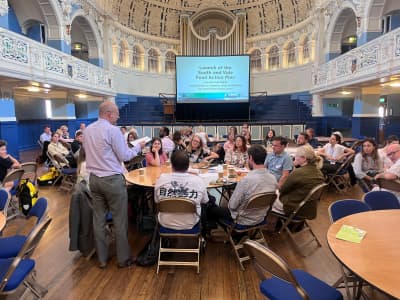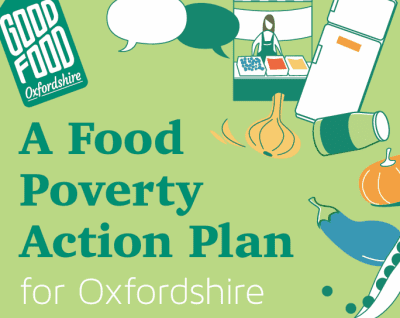Blog post by GFO summer intern Matipa Mukondiwa on Oxfordshire residents’ food-related lived experiences of COVID-19
According to Oxfam, the beginning of the Coronavirus pandemic saw 7.7 million adults in the United Kingdom having smaller meals or missing them altogether, whilst 3.7 million adults used a food bank or food from a charity (Oxfam Media Briefing 2020). My research as an intern with Good Food Oxford (GFO) sought to understand the stories behind such statistics through discussions with a small sample of Oxfordshire residents regarding their food-related experiences during COVID-19. Read the full research report here.
My research involved storytelling sessions and interviews with 13 individuals; 5 of whom were community food service leaders or representatives, 5 were individuals with lived experiences of food insecurity/poverty during COVID-19 and 3 were representatives of the East Oxford Farmers’ and Community Market and the South Oxford Farmers and Community Market (SOFACOMA). These 13 individuals (all names anonymised below) who kindly shared their stories with me informed a report that I compiled for GFO that had four main outcomes:
Firstly, the presence (or lack thereof) of a community that is centred around food was central to people’s lived experiences of COVID-19. For example, for Mia and Michael, going to the Waste2Taste café for food parcels and the Waste2Taste team checking up on them regularly enabled them to be part of a community during what has been an isolating time for many. Their experience highlights the importance of community food services in Oxfordshire during COVID-19 which is discussed in more depth in a previous GFO blog post.

Secondly, individuals highlighted the close relationship between food - and the (in)ability to access it - and their health. Members of medically high-risk groups cannot just go to the supermarket in the ‘new normal’ that has been ushered in by COVID-19 and so some of the research participants who did not have a strong community or familial support system at the beginning of the pandemic initially struggled to access food and lived on toast or Rice Krispies for example. For Scarlett, however, assistance from Cherwell Larder in the form of fresh vegetables to eat and ‘grow boxes’ for her to cultivate her own vegetables has helped achieve a healthier lifestyle for her diabetes and heart condition. Caring for their own vegetables has also helped Scarlett’s daughter who is autistic learn about cultivation and nutrition rather than just being told by an adult how important vegetables are.

Thirdly, the need for a strong and resilient local economy was evidenced in my discussions with individuals who are representatives of East Oxford Farmers’ and Community Market and SOFACOMA. A strong local economy has ties to Oxfordshire residents’ independence as this can encourage residents to grow their own produce. Ava explained this link when she pointed out that COVID-19 has “empowered people to go away and bake bread, to go away and grow in their back garden and that grows out of the link they have directly with the bread baker…the veg grower…So, there’s a direct link between where your food is coming from and what you end up with and how you might go away and see if you can generate it yourself” (Ava 2020).

Finally, an individual’s nationality and identity – be it ethnic or religious – affects their ability to access food during this pandemic as illustrated through my discussions with Aamaal who eats Halal. Aamaal has found that her nationality has impacted on her ability to get a job and the knock-on effect has been felt by her and her family and how they access food during COVID-19. Aamaal shared how she does not ask food suppliers for Halal boxes but instead requests vegetarian boxes as she does not expect suppliers to cater to Muslims’ dietary requirements. The implication of this on Aamaal and her family is little or no dignity when they are trying to access food. Aamaal’s food insecure status is compounded by how she has No Recourse to Public Funds (NRPF) which means she cannot obtain government assistance when she is in need.

The stories of this sample of Oxfordshire’s residents support the wider national picture that is emerging from lived experiences of food during COVID-19. To support more equitable and dignified experience for our residents we need to support our local Community Food Services – these services have provided invaluable lifelines for many individuals – not just providing food, but helping people to reduce food waste, feel connected to their community, and to have a sense of dignity around food. These services need: access to stable funding streams; delivery vehicles; premises and equipment as well as diverse supplies of high-quality food to meet people’s nutritional requirements, cultural and lifestyle choices.
Over time we need to empower people to connect to local producers and growing projects to diversify the range of foods available to those in food insecurity, as well as creating strong meaningful connections to food and its origins.
I am grateful to everyone who assisted me with this research, particularly for the assistance I received from the community food service representatives who signposted me to several of the individuals I interviewed.
Read the full research report here.
*All identities have been anonymised.



